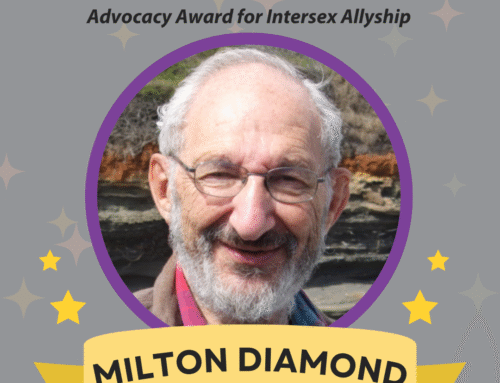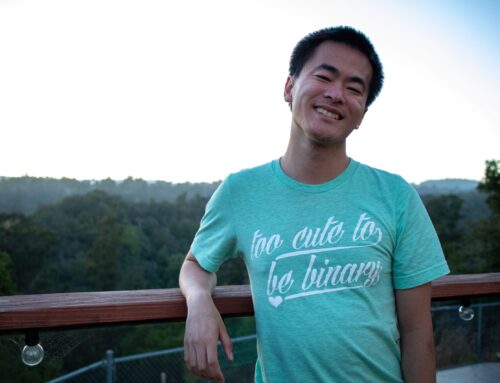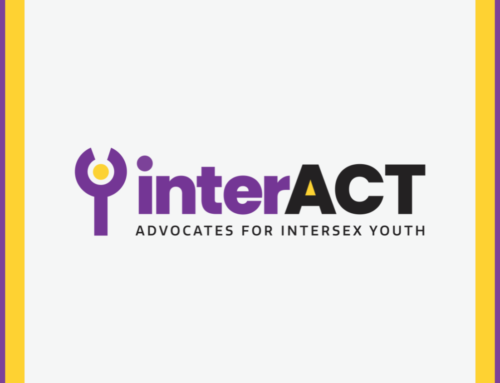AIC’s Blog Series, “Turning the Lens Inward,” features interviews with some of the key leaders and supporters who have helped make AIC the strong organization we are today! The second installment comes from AIC’s new Executive Director, Kimberly Zieselman.
——
At the end of my first day as AIC’s executive director a friend playfully asked me how it felt to be “the boss.” I thought about our small staff of exceptional people, how all three of us (scattered about the U.S.) support each other selflessly, and how from the beginning I knew I had an opportunity to be a part of something great.
I smiled, “It feels like I’ve been given a gift.”
With that said, if I’d been told five years ago I’d be in the position I am with AIC I would not have believed them. I first learned about Advocates for Informed Choice when I heard Anne Tamar-Mattis give a short talk on legal issues at the 2010 AIS-DSD Support Group conference. Anne’s simple, direct, and reasonable mission of informed consent and education stayed with me over the years and I began to follow AIC’s work with interest. It wasn’t long before Anne and I became friends and I joined the AIC family.
Since then AIC has had a tremendous impact on my personal and professional life. I was born with Androgen Insensitivity Syndrome (AIS): a unique experience paired with an all-too-common story. At age 15 I had surgery to remove my gonads and avoid “cancer.” I was told I was probably the only person “like this” in the world and I’d never be able to have children. I didn’t question it. I did what I was told. I was 41 when I first read my medical records that had unfamiliar words like “testicular feminization”, “male pseudo-hermaphrodite” and “AIS.” At first the information was scary but it thankfully led to much needed answers. To have the opportunity to earn a living using my education and skills in the struggle for the rights of children with intersex conditions and their families is an honor and a privilege.
As an intersex person who grew up in the 70’s and 80’s before information or support existed, it’s empowering to be in a position to help in a way that was not possible then. One of my favorite things about today’s intersex movement is watching our youth bloom. I feel lucky to be able to work alongside such resilient young advocates and witness a new generation of intersex voices through my work with our youth leadership development program, Inter/Act. Seeing kids, young adults, and families find community is one of my favorite things about this work.
Unfortunately, some disinformation persists within the medical community. Some of this is rooted within the false notion that intersex advocates are a “disgruntled vocal minority.” The claim that most intersex adults are satisfied with their medical treatment and are part of the “content and silent majority” couldn’t be further from the truth. One of my goals is to get medical providers and policy makers to acknowledge that most of us are not merely dissatisfied with past and present medical treatment, but that we have also been harmed, and in many cases, traumatized. Like other marginalized groups, our perceived “silence” does not come from satisfied contentment but rather from a unique muffled torment. In spite of this, our eyes are pointed toward the future.
This movement to prioritize informed consent and self-determination for intersex people is still relatively young, but I have great hope that the global intersex movement will become more unified in its efforts to collaborate in order to fight discrimination and eliminate “normalizing” surgeries. AIC has numerous vital domestic and international ally organizations, as well as individual activists and scholars who continue to contribute greatly to the movement with their voices, research, and writing. Globally, AIC is but one contributor to a necessary worldwide movement. Influential and significant intersex activists exist on every continent, and most work with extremely limited resources.
“As the new executive director of an organization I have grown to cherish, I remain optimistic that the sooner more foundations, governments, and individuals begin to recognize this discrepancy of support (along with the importance of seeing intersex advocacy as a human rights issue) the sooner our next steps forward will be taken together.”
In Community,







